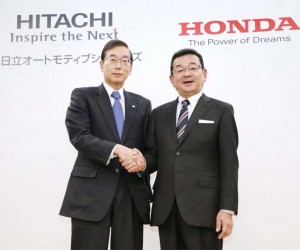Barely a week after announcing a tie-up with General Motors, Honda Motor Co. says it is launching a joint venture with Hitachi Ltd., one of the world’s largest producers of motors for use in battery-electric vehicles.
Hitachi already counts a number of other automakers among its clients, including the Renault-Nissan Alliance – which produces such models as the Nissan Leaf – as well as Toyota, Ford and Volkswagen. Honda hopes to use the new joint venture not only to supply its own, growing needs but to potentially sell motors to other automakers entering the EV space.
“In pairing up with Hitachi, we’re hoping to tap into its expertise in volume production,” Honda CEO Takahiro Hachigo said during a news media briefing in Japan. “Producing motors is capital intensive,” he added, “so rather than just manufacturing them for our own purposes, we would like to produce in large volumes with the possibility of supplying a variety of customers.”
Honda is clearly going to need plenty of electric motors in its own right. During a news conference at the North American International Auto Show in Detroit last month, the executive noted that “two-thirds of our vehicles…by 2030.”
(For more on those plans, Click Here.)
Rather than focus on specific types of green powertrain technology, the executive said Honda will opt for a mix of “carbon-free mobility.” About half of the Honda line-up in 2030 will be made up of conventional hybrids and plug-in hybrids, Hachigo said, with the remaining vehicles expected to use either pure battery-electric drivetrains or hydrogen-powered fuel-cells.
But what is relevant in light of the new Honda-Hitachi deal is that all of those vehicles will need some form of electric motor. Currently, Honda has three different hybrid systems in use, requiring a variety of different motors, some providing just a minor boost, others delivering high levels of performance, as with the three-motor system used on the Acura NSX supercar.
The new venture with Hitachi will be formalized in July, with a combined investment of 5 billion yen, or $44.69 million. Honda will take a minority, 49% stake.
The new company will produce electric motors for a wide range of different drivetrains, including hybrids, plug-in hybrids and pure battery-electric models. The same motors could also be used in future hydrogen fuel-cell vehicles such as the recently launched Honda Clarity FCV. A battery-electric version of the Clarity is now in final development.
(Honda delivers first U.S. fuel-cell vehicle – a year late. Click Here for the story.)
The plan is to manufacture and sell those motors in Japan, the United States and China. The partners did not say whether they have lined up other buyers besides Honda.
The tie-up with Hitachi – which already provides Honda parts such as brakes – underscores one of the more dramatic shifts in the auto industry in recent years. Manufacturers are increasingly willing to go into partnership with both suppliers and, in some cases, competitors, to help spread out R&D and manufacturing costs while boosting economies of scale.
That led Honda to announce a new partnership with General Motors late last month. They will pool resources to develop a new /wp-admin/post-new.phpgeneration of hydrogen fuel-cell powertrains that could be used in future automotive products, as well as a variety of non-automotive applications. The $85 million project is expected to begin production out of a new facility in Michigan by 2020.
(For more on the new Honda-GM joint venture, Click Here.)


